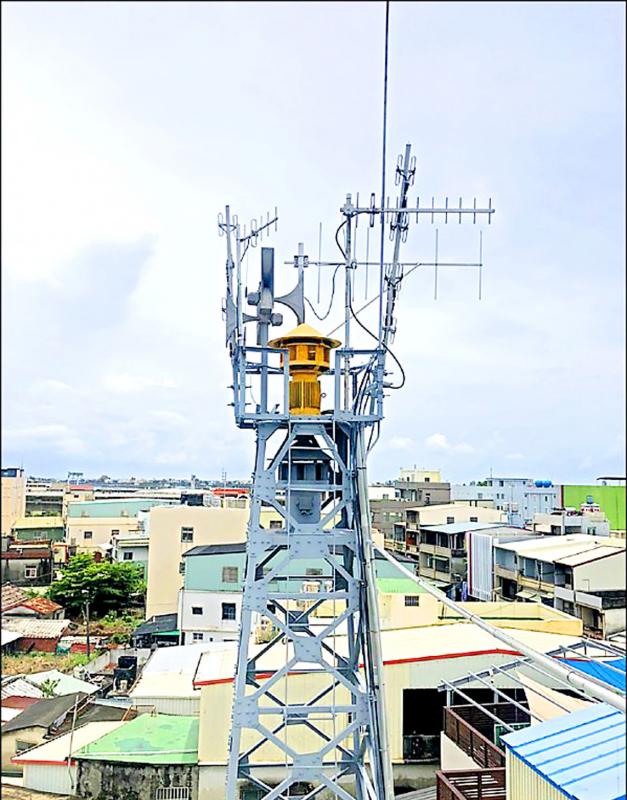About 350,000 people live in areas out of audible range of air-raid sirens, a National Audit Office report has found.
The people live in 38 towns and boroughs spread across seven cities and counties, the report said, citing information compiled by the National Police Agency in November last year.
The alarms are crucial for ensuring public safety in the event of an air attack or major natural disaster, it added.

Photo: Tsai Tseng-hien, Taipei Times
The National Police Agency’s Civil Defense Office completed a survey on Nov. 20 last year that used QGIS, an open-source geographic information system, to analyze the reach of the country’s 1,435 air-raid sirens.
The survey focused on boroughs and villages with a population of at least 9,605 people per square kilometer, and administrative areas with populations of at least 6,286 people.
The office found that in 38 communities across Taipei, New Taipei City, Keelung, Taoyuan, Taichung, Kaohsiung and Hsinchu County, people were unable to hear air-raid sirens due to their distance from the nearest siren or other geographical factors.
The Ministry of the Interior on Monday urged the governments of the affected cities and county to make necessary improvements.
Before more sirens are installed, communities could rely on police sirens, school public address systems and community offices to assist in alerting community members, it said.
The ministry said that the military would also coordinate with cellphone service providers to send text message warnings when emergencies occur, adding that it would test the system during the next annual Wanan military drill, when the public receives warnings to stay indoors while drills take place.
The public is unfamiliar with emergency procedures and unaware of where they can take cover during an emergency, Democratic Progressive Party Legislator Wang Ting-yu (王定宇) said, adding that the government should educate the public about emergency response drills.
Such drills would be especially important for those living near administration offices and military facilities, which would most likely be attacked in an armed conflict, he said.
“The Wanan drills are scheduled and people know to stay indoors, but in the event of a sudden attack, people are unlikely to know where to find safety,” retired air force lieutenant general Chang Yan-ting (張延廷) said.
Given the threat of military conflict with China, the government must ensure that people are informed about how to respond, he said, adding that the government should hold drills for the public.

The manufacture of the remaining 28 M1A2T Abrams tanks Taiwan purchased from the US has recently been completed, and they are expected to be delivered within the next one to two months, a source said yesterday. The Ministry of National Defense is arranging cargo ships to transport the tanks to Taiwan as soon as possible, said the source, who is familiar with the matter. The estimated arrival time ranges from late this month to early next month, the source said. The 28 Abrams tanks make up the third and final batch of a total of 108 tanks, valued at about NT$40.5 billion

Two Taiwanese prosecutors were questioned by Chinese security personnel at their hotel during a trip to China’s Henan Province this month, the Mainland Affairs Council (MAC) said yesterday. The officers had personal information on the prosecutors, including “when they were assigned to their posts, their work locations and job titles,” MAC Deputy Minister and spokesman Liang Wen-chieh (梁文傑) said. On top of asking about their agencies and positions, the officers also questioned the prosecutors about the Cross-Strait Joint Crime-Fighting and Judicial Mutual Assistance Agreement, a pact that serves as the framework for Taiwan-China cooperation on combating crime and providing judicial assistance, Liang

A group from the Taiwanese Designers in Australia association yesterday represented Taiwan at the Midsumma Pride March in Melbourne. The march, held in the St. Kilda suburb, is the city’s largest LGBTQIA+ parade and the flagship event of the annual Midsumma Festival. It attracted more than 45,000 spectators who supported the 400 groups and 10,000 marchers that participated this year, the association said. Taiwanese Designers said they organized a team to march for Taiwan this year, joining politicians, government agencies, professionals and community organizations in showing support for LGBTQIA+ people and diverse communities. As the first country in Asia to legalize same-sex

MOTIVES QUESTIONED The PLA considers Xi’s policies toward Taiwan to be driven by personal considerations rather than military assessment, the Epoch Times reports Chinese President Xi Jinping’s (習近平) latest purge of the Chinese People’s Liberation Army (PLA) leadership might have been prompted by the military’s opposition to plans of invading Taiwan, the Epoch Times said. The Chinese military opposes waging war against Taiwan by a large consensus, putting it at odds with Xi’s vision, the Falun Gong-affiliated daily said in a report on Thursday, citing anonymous sources with insight into the PLA’s inner workings. The opposition is not the opinion of a few generals, but a widely shared view among the PLA cadre, the Epoch Times cited them as saying. “Chinese forces know full well that